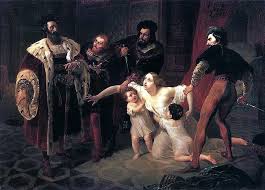morganatic
英 [ˌmɔː.ɡəˈnæt.ɪk]
美 [ˌmɔːr.ɡəˈnæt̬-]
- adj. 贵贱通婚的

记忆方法
记忆“morganatic”这个单词,可以将其分解为两个部分:“morgan”和“atic”。首先,想象一个人物或角色名字叫做“Morgan”,这个人以某种方式或特质而著名。然后,将“atic”想象为形容词后缀,表示与“Morgan”的特质或行为相关的状态。这样,你可以记住“morganatic”指的是与“Morgan”相关的婚姻(通常是贵族与平民的婚姻),这种婚姻不受贵族传统血统要求的约束。通过这个联想,即使忘记单词拼写,也能通过故事记忆法回忆起其含义。
以上内容由AI生成, 仅供参考和借鉴
英语词源
- morganatic
-
morganatic: [18] A morganatic marriage is one between people of different social status, in which the rank and entitlements of the higherstatus partner are not shared by the lower or their offspring. The word morganatic is a survival of an ancient Germanic marriage custom. On the morning after the wedding night, after the marriage had been consummated, the husband gave the wife a symbolic gift, which removed any further legal claim the wife or their children might have on his possessions.
The term for this useful gift was *morgangeba, a compound formed from *morgan (ancestor of English morning) and *geba (a noun formed from the same base as produced English give). The word was adopted into medieval Latin as morganaticus, from which (via either French or German) English got morganatic.
=> morning, give - morganatic (adj.)
- 1727, from French morganatique (18c.), from Medieval Latin matrimonium ad morganaticam "marriage of the morning," probably from Old High German *morgangeba (Middle High German morgengabe) "morning gift," corresponding to Old English morgengifu (see morn + gift). In an unequal marriage between a man of royal blood and a common woman, this was a gift traditionally given to the wife on the morning after consummation, representing the only share she and her children may claim in the husband's estate. Also known as left-handed marriage, because the groom gives the bride his left hand instead of his right, but sometimes this latter term is used of a class of marriage (especially in Germany) where the spouse of inferior rank is not elevated, but the children inherit rights of succession. Related: Morganatically.
权威例句
- 1. It is morganatic marriage or none. "
- 要结就按和民女联姻的排场办,不这样办就别结. ”